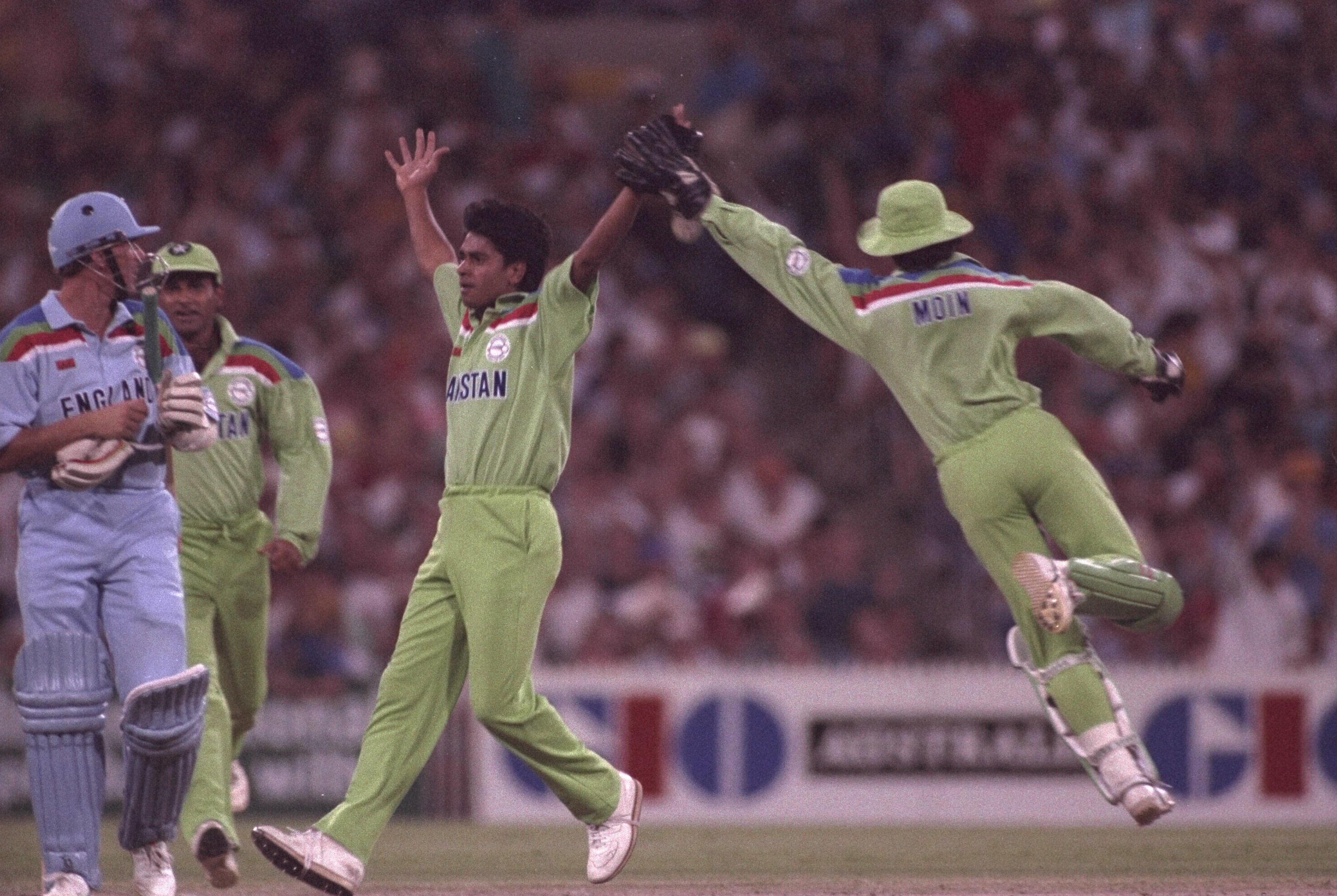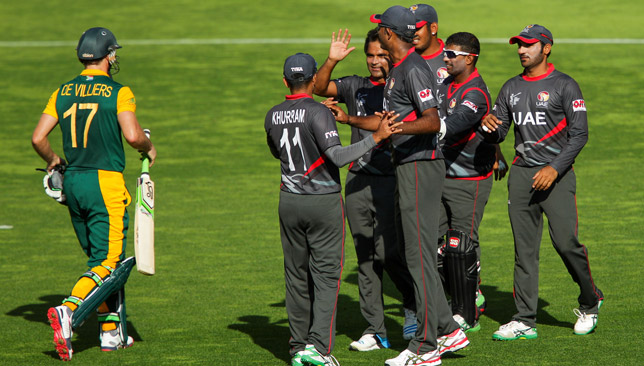With container packed, visa cancelled and after a litany of banking and mundane administrative tasks dealt with, former Pakistan international Aaqib Javed left the UAE last month – as so many do in this transient country.
A four-year stint as UAE’s head coach was brought to an end as his homeland called, a scenario familiar with the largely expat population of this corner of the Middle East.
However, unlike the bankers, oil riggers or teachers, Javed didn’t just leave with a better tan and bigger bank balance. He departed having left an indelible mark on sport in the UAE.
Two appearances at World Cups are the pair of glorious examples of success on his CV but it is the professionalism that he instilled in UAE cricket that is Javed’s true legacy.
Visas are still being drawn up by the Emirates Cricket Board in what has been a painstakingly long process, but the 12 centrally contracted players have already begun life as professional cricketers, Javed leading them in one of his final sessions.
He has helped those players – Swapnil Patil, Mohammad Qasim, Mohammad Usman, Imran Haider, Qadeer Khan, Rameez Shehzad and Shahzad Manna are believed to be on ECB visas, while Amjad Javed, Ahmad Raza, Mohammad Naveed and Shaimon Anwar all on their own visas and another to be confirmed –fulfil lifelong dreams.
As predominantly Pakistani, Indian and Sri Lankan expats, many of them watched Javed as youngsters.
And after moving to the UAE, they found him a man who could deliver them opportunities to take on the likes of West Indies, India and Australia in front of thousands of fans in iconic stadiums and beamed to millions of viewers around the world.

In even the most individual of sports it is far too simplistic to put success and failure on a single pair of shoulders but considering the state of UAE cricket when Javed took over, he has been rightly lauded for his tenure as UAE coach.
“The disappointing start was when I saw them play against Scotland,” Javed told Sport360 of his first assignment as UAE coach back in February 2012 – a seven-wicket Intercontinental Cup defeat in Sharjah.
“The worry was their fitness level, their appearance and mindset. They were playing for more than a hobby but were more like club cricketers. There were a few professional players, Khurram Khan was exceptional, Saqib Ali was one of the professional players and lately the way Shaiman Anwar modified his way to a professional journey was phenomenal. Amjad Javed, too, is a real fighter.
“We have had some good player but a lot of amateurs,. So to turn them from a club cricketer to international cricketer was the biggest challenge. It always starts from you. What you actually want, what you actually think and what your work ethic is. My philosophy is simple: bring honesty to your work, yourself and to others. If you believe that others should help you moving forward then you have to help them as well.
“I started running in front of them and I started working hard. I said let’s get together and move forward and change your mentality.”
Mentality is something Javed often refers to and is something he is obviously proud to have instilled among his charges in the UAE, particularly when you consider the commitment these players have made just to wield willow in this country.
And having arrived from the professional set-up of Pakistan’s National Academy, and then its senior men’s team, the environment of UAE cricket caught him off guard.
“That mentality was really, really difficult to improve because they had a lot of excuses, genuine excuses,” said Javed at ICC Academy. “When you’re living in Ajman or Sharjah and working in Dubai, it takes two hours to get into your office. So you’re up at 5am in the morning, getting to the office at eight o’clock and a few people are working 12-hour or 10-hour shifts.
“They finish at 5:30 or 6pm and then head to ICC Academy for training, training until late and then it’s 10:30/11pm by the time they are reaching home. I think that was an unbelievable lifestyle which is unreal.
“They worked hard and really pushed hard. They ignored their families, they ignored everything and wanted to make a point that they wanted to achieve something.
“I had no idea before [taking the job], because I was completely out of the picture as to what Associate cricket is. I’d never even thought of it. When I joined, then I came to know the opportunities – qualifying for the World Cup was the biggest goal.”
And qualify they did, 19 years on from their first 50-over World Cup appearance.

UAE players celebrate the wicket of AB de Villiers at the World Cup.
It brought great fanfare and the likes of Shaiman Anwar and Mohammad Naveed endeared themselves to the wider world as the UAE produced some highly entertaining performances.
Talks of winning two matches were way off the mark though, and the replacement of Khurram as captain in favour of Emirati Mohammad Tauqir was harsh and certainly not the preparation an Associate team needed ahead of such a tournament.
But regardless, the UAE had reached its primary goal at the first attempt under Javed, on the back of a first World T20 appearance in 2014 and prior to qualifying for this year’s Asia Cup proper.
Failure to reach a second World T20 in 2016 remains the biggest blip of Javed’s spell in the UAE considering the team was more than capable of reaching the tournament. The manner in which they performed in qualifying was turgid as best.
Ultimately, the thought of doing it all over again was a task Javed felt best left to someone capable of injecting fresh impetus into the side, one now looking to benefit from its new professional setup.
“Four years for any coach associated with one team is a long time,” explained Javed. “People can work in different areas as CEO, managers, whatever but a coach job is different. It’s all about performance.
Foreign players "willing to come to Pakistan" and play @thePSLt20 says Aaqib Javed. More; https://t.co/P3MiWJQ1U4 pic.twitter.com/Ev6xJSxePV
— Sport360° (@Sport360) June 26, 2016
“I think it’s been a really exciting journey. If I look back to 2012 when I joined the UAE, quitting as bowling coach of the Pakistan team and joining the UAE was a big ask. I think together we’ve done a decent job.”
Javed laughs when it’s put to him that he’s selling himself short by saying he did a “decent job”, before the affable former Pakistan quick eventually allows himself to acknowledge the much improved set-up that welcomes the next coach, as well as the part he has played in establishing the UAE as a fully-fledged ODI outfit.
“The progress is really difficult to absorb,” said Javed. “Moving forward, I think the first step is really hard but then you keep on moving forward. It took the ECB so long to realise that contracts are really important because if we want to achieve something in cricket, if we want to beat international teams then you have to have a squad as close to their international set-ups as possible.
“I don’t think anyone can expect results from amateurs. This is not a joke, you are playing some serious cricket.
“I am happy because when I joined them they had nothing and in four years I think we, as the UAE, has achieved a lot and every point is getting into good shape.
“I used to deal with ten or twelve selectors and now there are two full-time selectors who are cricketers and understand the game so they will make better decisions. Then there are full-time, committed players who will be at the ICC Academy from 10am-4pm. I’m delighted to be leaving UAE cricket at a good point.”
And although Javed feels like it’s the perfect time to leave, for both him and UAE cricket, it was not a decision he took lightly – particularly as his daughter had been schooled here and his family were happy and settled.
But the Pakistan head coaching job came and went and then the role of director of cricket with Lahore Qalandars cropped up, an opportunity he viewed as too good to turn down.
It represents a similar challenge in building a burgeoning team up from the very bottom of the pile.
“I gave it a thought because four years I still believe is a long time working with the same team. Mostly, I think we have achieved what we could. I wanted to try something else and can’t motivate myself to repeat all this that we’ve already done.
“I think when the Lahore Qalandars role popped up and there was the time when Pakistan was talking to me I think I decided then to move on.
“I’m happy to have joined as cricket director at Lahore Qalandars and that is a perfect platform for me and a new challenge because they are an important team in the PSL and now I’m moving back to Pakistan and working on making Qalandars champions of the PSL and that’s really exciting, isn’t it?”
If his UAE stint is anything to go by then for everyone involved with the PSL and Qalandars, it should be.